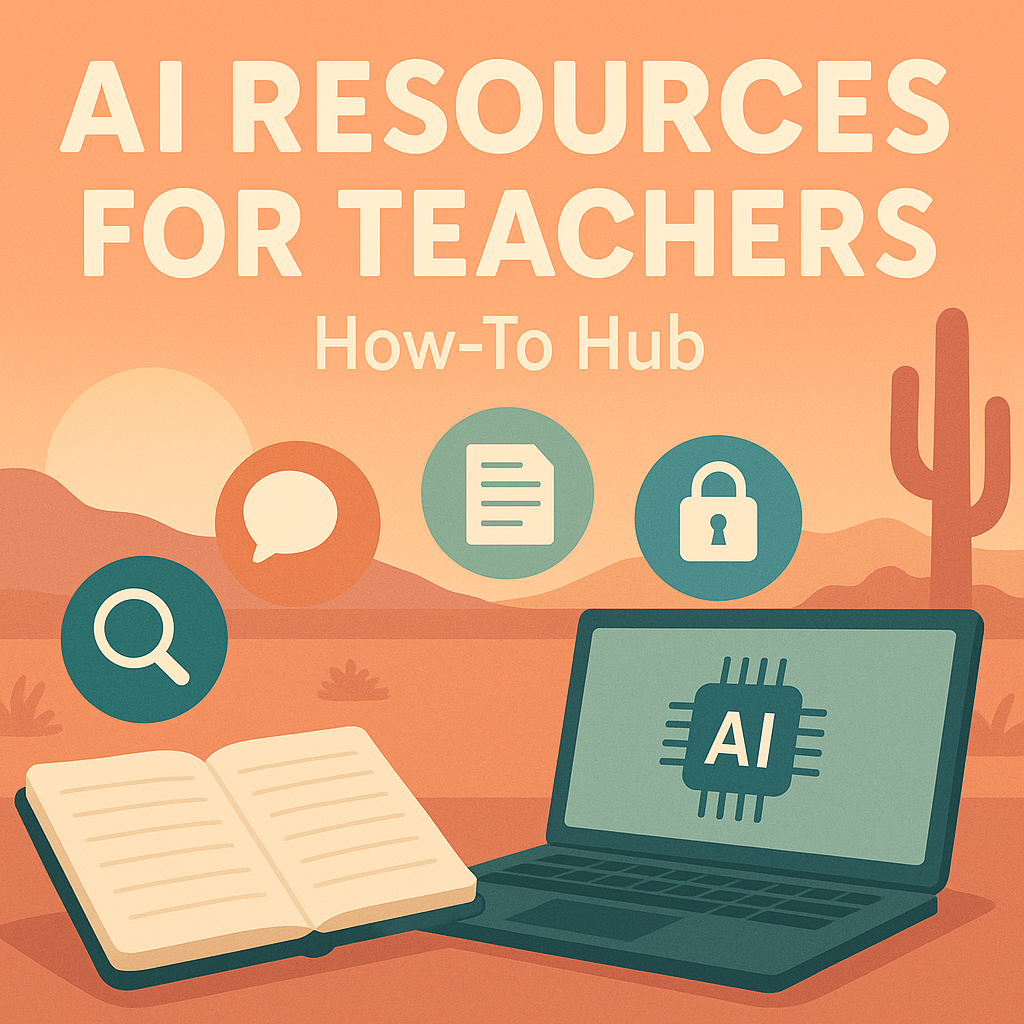
A collection of guides, toolkits, and frameworks drawn from the Arizona Generative Artificial Intelligence in K–12 Education Guidance (2025). These resources cover classroom use, leadership & implementation, data privacy, academic integrity, family engagement, and AI literacy.
Based on the Arizona Generative Artificial Intelligence in K–12 Education Guidance (2025) and companion national/global frameworks. Use this as your launchpad for safe, ethical, and effective AI in classrooms, schools, and districts.
Who this is for:
-
Teachers & Instructional Coaches: grab-and-go lessons, PD, and classroom guardrails
-
School & District Leaders: policy toolkits, implementation frameworks
-
Families: plain-language guides to support learning at home
Why now? As AI becomes part of everyday teaching and learning, these resources help you build clear guidance, protect privacy, uphold academic integrity, and develop authentic AI literacy for students.
Quick Start (pick one path)
-
Adopt guidance: Start with TeachAI’s AI Guidance for Schools Toolkit (policy templates + sample language). TeachAI Toolkit
-
Choose a classroom track: Use aiEDU units or MIT Day of AI lessons for an immediate, standards-aligned start. aiedu.org/intro-to-ai
-
Cover the safety base: Pair CoSN’s Student Data Privacy Toolkit with FPF’s vetting guide before turning on any tools. cosn.org/tools-and-resources/resource/student-data-privacy-toolkit-part-1-2-3
General Resources (orientation + big-picture)
- US Dept. of Education (OET) — AI and the Future of Teaching & Learning: insights, recommendations, and a 1-page core-messages handout. www.ed.gov/sites/ed/files/documents/ai-report/ai-report.pdf
- Microsoft Education — AI Toolkit & educator center: strategies for rollout, PD, exemplar use cases, and classroom materials. www.microsoft.com/en-us/education/blog/2024/04/kickstart-your-schools-ai-journey-with-the-microsoft-education-ai-toolkit/
- Learn21 — Generative AI series + annotated bibliography: research summaries with practical classroom translations. learn21.org/ai-video-series-empowering-educators-with-generative-ai/
AI Leadership & Implementation (district/school level)
- TeachAI — Guidance for Schools Toolkit: principles, model policies, and sample guidance to customize for your LEA. teachai.org/toolkit
- ILO Group — Framework for Implementing AI in K-12: district-wide areas of consideration (political, operational, technical, fiscal) + department examples. ILO Group - Framework for Implementing AI
- European Commission — Ethical Guidelines for Educators: practical guardrails on AI & data in teaching/learning. Publications Office of the EU
Data Privacy (before you enable any tool)
- Future of Privacy Forum (FPF) — Vetting Generative AI Tools for Use in Schools + “AI in Education: Key Concepts and Uses” infographic. Student Privacy Compass
- CoSN — Student Data Privacy Toolkit (Parts 1–3): how to build/operate a privacy program & work with vendors. Student Data Privacy Toolkit
- Access 4 Learning / Student Data Privacy Consortium — AZ Student Privacy Alliance (AZSPA) registry & model agreements. privacy.a4l.org
Academic Integrity (clear expectations + assessment design)
- Matt Miller (Ditch That Textbook) — “AI in the classroom: What’s cheating? What’s OK?” (policy clarity + classroom moves). Ditch That Textbook
- Perkins, Furze, Roe & MacVaugh — AI Assessment Scale (AIAS): choose appropriate levels of GenAI in assessments. AI Assessment Scale (AIAS)
- Dr. Rahul Kumar / Postplagiarism — reframing integrity in an AI era; practical considerations for policy. Postplagiarism
Family Engagement
- Common Sense (Parent-facing AI resources) — districts often link to these for plain-language explainers and guardrails. AI Kids Critical Thinking
- NAMLE — Understanding Generative AI: A Guide for Parents (PDF): discussion starters, benefits/risks, and media-literacy anchors. NAMLE
AI Literacy — For Educators
- AI4K12 — 5 Big Ideas, grade-band progressions, and activity resource guides. AI4K12
- Digital Education Council — AI Literacy Framework (2025): human-centered competencies and dimensions. Digital Education Council
- Evergreen Education — AI Competencies for K-12: practical competency model + implementation programs. Evergreen Education
- Leo S. Lo — CLEAR Framework (prompting for info-literacy): concise, logical, explicit, adaptive, reflective. ScienceDirect
- UNESCO — AI Competency Framework for Students: 12 competencies across four dimensions (human-centered mindset, ethics, techniques, data). UNESCO
AI Literacy — For Students (grab-and-go)
- aiEDU — Intro to AI (10-week PBL) + short “AI Snapshots.” Intro to AI
- MIT RAISE — Day of AI (K-12 lessons, PD, assessments) + AI Ethics Curriculum for Middle School (open-source). The Center at MIT - Day of AI
- Code.org — AI curricula (AI Foundations, Hour of AI, coding with AI). Code.org
- Common Sense Education — AI Literacy lessons (6–12): quick, critical-thinking mini-lessons often syndicated by state partners. Colorado Department of Education
How to Use This Hub (step-by-step)
- Set the ground rules
- Adopt/adapt the TeachAI policy templates and publish a one-page “What’s OK / What’s Not” for staff & students. TeachAI
- Vet tools before rollout
- Run vendors through FPF’s vetting checklist; align contracts with CoSN guidance & your state privacy alliance (e.g., AZSPA). Student Privacy Compass
- Launch classroom pilots
- Pick one of: aiEDU, Day of AI, or Code.org AI Foundations. Collect student work samples and teacher reflections for iteration. aiEDU - Intro to AI
- Address integrity up front
- Pair your syllabus language with the AI Assessment Scale and the “What’s cheating? What’s OK?” guidance. arxiv.org
- Bring families along
- Share NAMLE’s Parent Guide to Generative AI and your district’s policy FAQ; host a 30-minute Q&A. NAMLE
Attribution
This article was adapted from the Arizona Generative AI in K–12 Education Guidance and curated national/global resources.